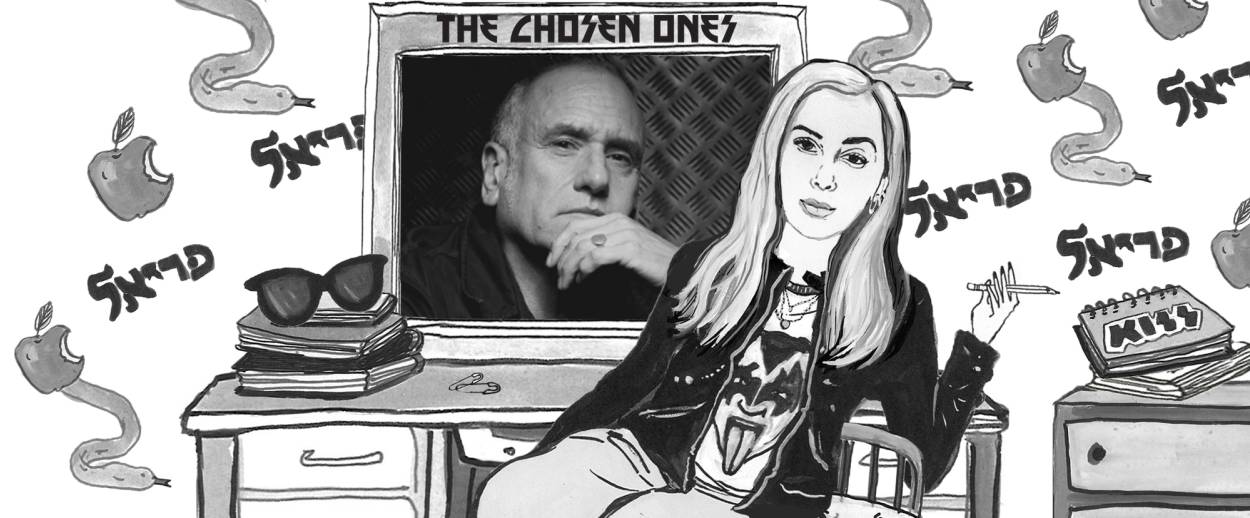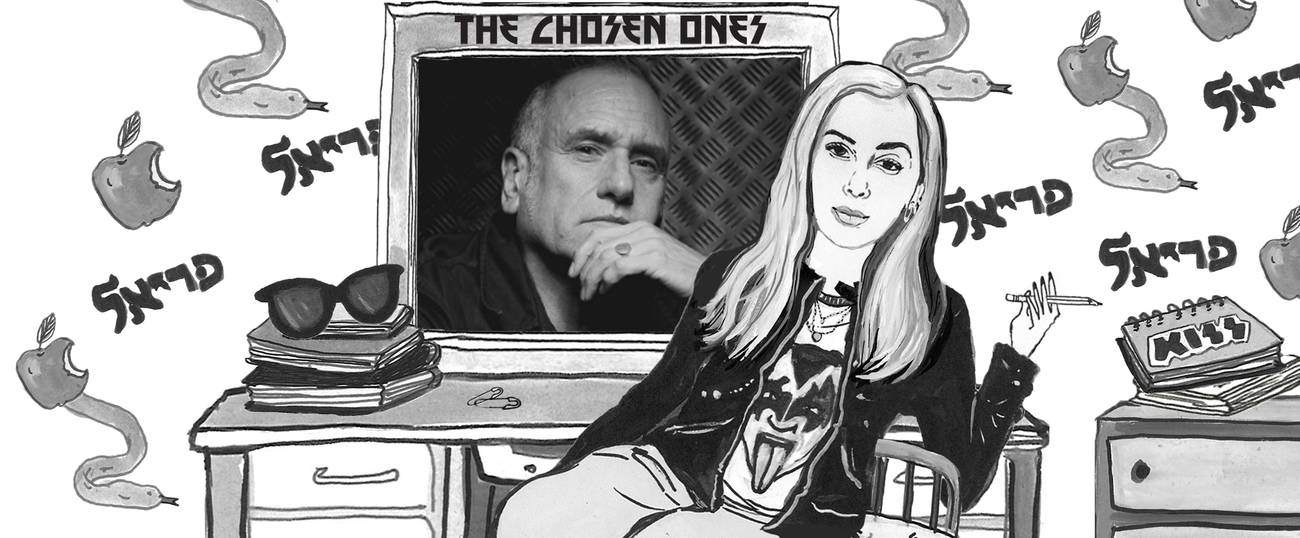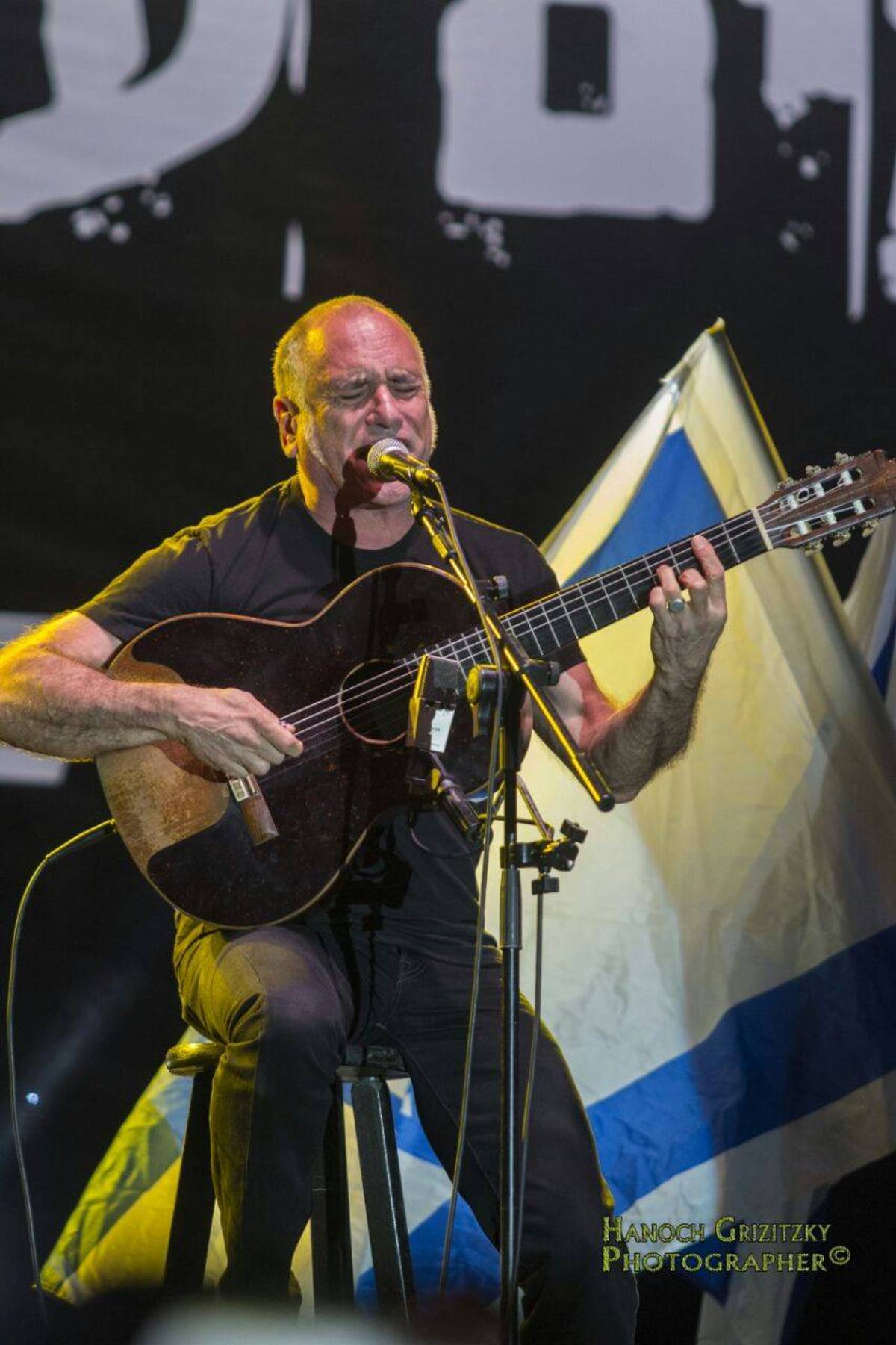The United States has Bruce Springsteen and Israel has, well, David Broza. Their obvious talents notwithstanding, the singer-songwriters are both well known for their poetic lyrics, their charm and, I’d be remiss not to at least mention, their gruff good looks. But their similarities don’t end there. Like Springsteen and, frankly, any superstar worth his or her own salt, Broza is as well known for his dedication to humanitarian causes as he is for his music. He has been working since 1977 to help bring peace to the Israeli-Palestinian conflict and his hit song, “Yihye Tov” (“Things Will Get Better”), has become an anthem, so to speak, of the peace process.
His music is considered a “fusion of three countries in which he was raised—Israel, England, and Spain.” He fills concert halls with his “famous guitar playing, ranging from flamenco-flavored rhythmic and percussive techniques, to whirlwind finger picking, to a signature rock’n’roll sound,” as his websites describes, and has released over 30 albums, many of which have gone gold or platinum. His 2013 album, East Jerusalem/West Jersualem, produced by Grammy Award-winner Steve Earle and Steve Greenberg was recorded entirely in the Palestinian Sabreen Studio in East Jerusalem. The work resulted in a documentary of the same name (Broza co-wrote the screenplay) that Vanity Fair called “extraordinary,” adding “if no one else is going to try and heal the world, he will.”
Broza has lived in between New York and Tel Aviv for the past 30 years. I caught up with him in Tribeca, a few weeks before he plays his annual Christmas gig.
Periel Aschenbrand: I actually named my son after one of your songs, “B’rakim U’Reamim.” (Thunder and Lightning).
PA: I know. Tell me about your upcoming show at Town Hall.
DB: It’s on January 7, which is usually my Christmas show. For the past 20 years I’ve done my “The David Broza, Not Exactly Christmas Show” at the 92nd Street Y.
PA: You’re not doing it this year?
DB: I’m doing it on January 7, which is the Greek Orthodox Christmas. So it’s still Christmas.
PA: I guess that’s good…for the Greeks.
PA: Ha! Right. Do you have favorite spot in New York to play?
DB: I just played a sweet show at The Rubin Museum on 17th street, with no sound.
PA: I’m sure that’s very intimate. But isn’t that hard, to play with no sound?
DB: No, I love it. I love it when people say, I can’t hear you. I say, well you’re not listening. When you listen, you hear everything.
PA: It’s like that Anais Nin quote.
PA: “We see the world not as it is, but as we are.”
DB: Sophisticatedly complex. Because it’s about asking questions. Like in the Haggadah they say, ‘And to he who doesn’t ask questions, who doesn’t know how to ask questions… He is the worrisome one.’
PA: That’s very appropriate for what’s going on in this country right now.
DB: In this world right now. As it unfolds every day.
PA: It’s unbelievable what a fucking mess it all is.
PA: It’s a huge mess. Look what’s going on in this country.
DB: Contemplate a little bit. Listen, I do worry, but I spent from my life 12 to 18 years old living in Madrid under Franco, in a dictatorship. My father moved his business there and we were thrust onto the Spanish culture and given an English education at a British school at a Trotskian school. They were raising a bunch of renegades.
PA: When did you go back to Israel?
DB: For the Yom Kippur War. I didn’t have to go, but I enlisted, which was the best thing I could have done for myself because I was undecided anarchist.
PA: You were already a musician?
DB: I was a painter who played guitar.
PA: Wow. You still paint?
DB: No, I dropped it after I wrote “Yihye Tov.” My dream was to go to RISD (Rhode Island School of Design), but God had other plans. I signed a deal with the record companies and never looked back. I’ve been making music for 39 years.
PA: And you’ve always been very politically active.
DB: I’m artistically possessed by art, so this is my life. All art. I translate it into music because it’s my vocation.
PA: That doesn’t really address the question, but we can get back to it. When did you come to New York?
DB: In 1984. All roads led me to the U.S.—Bob Dylan, Buddy Holly, Lead Belly, Jimi Hendrix… I wanted to see where it all came from. New York is, of course, not where it came from but where it all ends up. And I got here and started the search. My points of reference were the poets, so I started reading American poetry. For years. I read everything. Then I found Alberto Rios. And I figured out who published his book and I called him and I told him I was an Israeli artist making music to his poems. He thought it was a prank but eventually he was like, “Come visit me in Nogales.”
PA: Who are some of the other American poets that you love?
PA: Very interesting answer.
DB: I wrote music to one of her poems, “One Art. “It’s about the art of losing. You know it?
PA: I know the poem but not the song. I actually have a Master’s Degree in poetry, if I may say so.
DB: You’re missing out. Big time. If I may say.
DB: It’s a brilliant song.
PA: I’m sure it is. And then?
DB: From 1990 to 2000, I taught at the MFA Program at Bennington College.
PA: So who are some of your favorites?
DB: He’s not a poet but I have an album called Stone and Kiss named after one of Bob Shacochis’s stories. He’s the best short story teller in this country, by far.
DB: Theodore Roethke. And there’s David St. John. And there’s Heather McCugh. And there’s Matthew Graham. And there’s Alberto Rios. And Anne Sexton. And the list goes on.
Broza performing in November, 2015. (Image: Facebook / Hanoch Grizitzky)
PA: No?! I’m so surprised.
DB: We did work together. But no. Too obvious.
DB: And David Amram. I worked with David Amram.
DB: You know who David Amram is, right?
PA: I think so. Wait. I think I’m thinking of the artist Daniel Arsham.
DB: You don’t know who David Amram is?!
PA: To be honest, music is the art I know the least about. For me, it’s like, there’s hip hop, Bob Marley, The Beatles and, well… you. That’s more or less it.
DB: Wow. I’m in good very company.
PA: Yes, at least you’re in good company. Anyway.
DB: Anyway, David Amram is the one who invented the Beat Generation. He skats; he actually invented skat, I think. He was the first conductor on West Side Story under Leonard Bernstein at the New York Philharmonic. He worked with Thelonious Monk. He is the most celebrated American composer alive. He wrote the music for The Manchurian Candidate, which won an Oscar. He taught Bob Dylan. He conducts my symphonic suite.
David introduced me to Townes Van Zandt. Remember when I told you I came to New York looking for something? That’s what I was looking for. The hard living, singer, song writer, troubadour. He was the man. And they put us in front of each other and we did a four-hour duet. When he died, he willed to me his unpublished poetry which took me 12 to get, and write music to and produce as an album called, Nightdawn, The Unpublished Poetry of Townes Van Zandt, which I am hoping to complete as a film. It is the follow up to the film East Jerusalem/West Jerusalem.
There was just a big piece in The New York Times about the refugee camp where I work… so back to your question about political activism.
PA: Your activism has always been considered pretty radical.
DB: For a vegetarian, a carnivore is radical. This is just the way the world is for me. It’s in my skin. Since I was a kid, the kind of people I gravitated toward were artists and free thinkers. And I have since sent all of my kids to Shomer Harzaeer, which is the original socialist movement, the real Marxist movement from the 1920s, which raises your kids to have values and those kids end up create social movements like Occupy Wall Street to correct the wrongs of a society. All over the world. Ari Rahm is going to go to Shomer Harzaeer.
PA: I hope so. In the meantime, though, what’s your favorite drink?
DB: Favorite drink? I’m having a green tea. Is that my favorite drink?
PA: I don’t know is that your favorite drink?
PA: This isn’t a trick question.
DB: A glass of wine. In our family we drink wine that we’ve been making for over 100 years. It’s called Red Poetry. That’s my favorite drink.
PA: Good. How do you eat your eggs?
DB: I burn the bottom and flip them just for a split second, so they’re over easy.
PA: How do you drink your coffee?
DB: Black. Long espresso.
PA: What’s your favorite Jewish Holiday?
DB: I like all the holidays. Jewish, non Jewish. Anything that brings us all together, that’s what I like.
PA: Did you have a bar mitzvah?
DB: Of course. It was a disaster.
DB: I don’t think I remembered my Haftorah.
PA: Really?! That’s surprising! What did you wear?
DB: White shirt, blue pants. And a kippa.
PA: What shampoo do you use?
DB: Anything. I’m in hotels all the time. Whatever says “shampoo” on it.
DB: Both. But it has to be special lox.
PA: Five things in your bag right now?
PA: Passports? How many do you have?!
DB: My passports, my notebook, my book…. How many is that?
DB: Honestly, all I need is my bag and my guitar.
PA: How many guitars do you have?
DB: Many, but I only use one.
DB: It’s handmade. It’s a Contreras from Madrid.
PA: Favorite pair of shoes?
DB: My Spanish riding boots.


